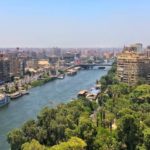Egyptian Protests: Seeing Action and Change First Hand


“So do you do this everyday?”
The tour guide scoffed. “Not since that so-called revolution, no.”
It’s the same sort of reaction from the merchants in Khan al-Khalili, Cairo’s main market for useless trinkets. “American?” they ask me. “This is good, very good! Not lot of Americans now. Welcome! Special price!”
I can’t even imagine the pride of the Egyptians. I watch the revolution songs on Youtube and I look at the Facebook pages calling for a Nobel Prize for the Egyptian youth and I listen to my friends’ stories of staying up all night to police their neighborhoods, and the level of hope is dizzying. What must it be like to fight tooth and nail to topple a government and now, fight tooth and nail to build one from the ground up? The possibilities are overwhelming.
Egyptian Protests: Seeing Action and Change First Hand
And overwhelmingly heavy. It all weighs very heavily. I wake up in the middle of the night sometimes, anxious that it won’t all work out, and I’m struck by how closely fear runs into hope. And I wonder how anyone here sleeps through the night.
Because what the Egyptian people fought for is worthy and important and it means more than anything I’ve ever come across; it likely means more than anything else we’ll see in our entire lives. And if it ends up meaning nothing at all, what does that say?
The coffee here is served black and grainy, with an extra infusion of ginger. It’s utterly disgusting and I absolutely love it, because it’s the closest thing I can imagine to the taste of Cairo, which is a city of equal parts stubbornness and cynicism and which is full of too many people who’ve been trying for far too long. And now there’s a choice: either the entire world is changing on them, or it never will. And they don’t have the slightest clue which way they’re going, or which way they wants things to go–but by golly they’re going to get there.
My favorite thing about Cairo is the streets. Aside from the amusement of seeing a man carry two children and desk chair on a motorcycle, all of the roads here are bordered on both sides by concrete walls. And these concrete walls are the Facebook page of Egypt.
There’s a mural near where I live: the silhouette of a man, broken chains hanging from each of his outstretched arms, standing before a faceless crowd. Every evening, my bus stops near the phrase “America, stop killing Muslims,” and we drive past “White House made in Egypt” every morning on the way to school. There are anarcho- asculine paintings from defiant gangs of Ultras. Mohamed Morsi and Ahmed Shafik stare at me from their torn and faded election posters. The artwork in Tahrir rotates constantly, one colorful portrait of World Peace taking over another.
And everywhere you go, without fail, you find stencils of the faces of revolution martyrs.
And everywhere you go, without fail, you find stencils of the faces of revolution martyrs.
Student strikes shut down my university for nearly two weeks at the beginning of the year. We could feel the tension building up for about a week–signs were put up around campus detailing the percentage rise in tuition over the past five years, the university president’s salary, and the university’s rankings in the region. Student organizers gave speeches in the parking lots. Meetings with the administration ended badly.
And so when my bus pulled up to campus one Sunday morning, we found around 20 cars between us and the gate. The gates were locked; protesters weren’t letting anyone through. People stood in the sun for hours, not knowing whether they should leave or keep trying to get to class, and there weren’t enough taxis in the area to get everyone back home. The university refused to call off classes, insisting that education wouldn’t be interrupted for a bunch of hooligans.
Next day, same story, except the protesters provided water and arranged buses back home for those students defiant enough to try coming again. The day after that, the university administration gave up its posturing and told students and faculty to not even try coming. But they planned to resume classes the next morning; they removed the gates so that the students wouldn’t be able to chain them, and upped their security.
That night, at 3 am, the student strikers arrived on campus with brand new gates. They were installed by morning. Tuition was capped for the next five years.
I am amazed that Mubarak even lasted as long as he did.








